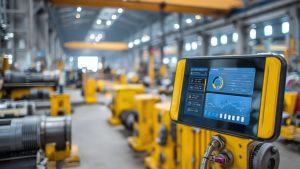In today’s fast-paced manufacturing world, leveraging AI is essential. This goes beyond robots on the assembly line. AI now impacts every aspect of manufacturing, especially the supply chain.
Table Of Contents:
- The Role of AI in Modern Manufacturing
- The Importance of Efficient Supply Chain Management
- Understanding AI in Supply Chain Management
- Real-World Applications of Leveraging AI in Supply Chain
- Overcoming Challenges in AI Implementation
- How NUshift Can Help
- Conclusion
The Role of AI in Modern Manufacturing
AI is transforming manufacturing. From predictive maintenance to quality control, AI-powered tools help companies work faster and smarter. This changes how manufacturers manage resources, make decisions, and predict future needs.
The Importance of Efficient Supply Chain Management
A well-run supply chain ensures business success. In manufacturing, an efficient supply chain is crucial for a thriving business. A McKinsey study shows AI-focused businesses achieve cost savings and revenue growth through data analysis.
Understanding AI in Supply Chain Management
What is AI?
Artificial intelligence empowers computers to perform tasks requiring human intelligence. This includes problem-solving, learning, and decision-making. AI enables computers to think and react like humans, offering AI solutions for complex business problems.
AI Technologies in Supply Chain
Different AI technologies offer unique advantages:
- Machine learning (ML): Algorithms analyze vast amounts of data to predict future events and improve operations.
- Natural language processing (NLP): This technology helps computers understand text and speech. It’s used in chatbots for automated customer service and data entry.
- Predictive analytics: Data-driven insights guide better decisions by identifying trends and potential issues, such as forecasting customer demands.
These AI technologies provide real-time data and insights from vast amounts of information. This allows businesses to identify key trends and make informed decisions for a competitive advantage. Businesses are implementing these advancements in areas like customer service and social media posts to create dynamic content based on user interests.
Benefits of Leveraging AI in Supply Chain Management
Using AI effectively in supply chains leads to faster processes through automation. Businesses discover data-driven ways to reduce spending and operational efficiency. Data-backed decisions replace those based on intuition, driving digital transformation across business operations.
Real-World Applications of Leveraging AI in Supply Chain
Predictive Maintenance
AI predicts equipment failures before they occur. This proactive approach optimizes maintenance schedules and cost forecasts. AI systems in trucking demonstrate enhanced productivity and safety.
Inventory Management
AI forecasts demand to optimize inventory levels. This avoids overstocking and shortages, leading to cost savings. AI’s ability to manage vast amounts of data leads to efficient data collection and management.
Logistics and Transportation
AI enhances package delivery by optimizing routes and predicting potential delays or disruptions based on data collection. This leads to faster deliveries, lower costs, and improved customer satisfaction. AI-powered route optimization minimizes theft and lost items using real-time data analysis. Chamber of Commerce statistics highlight the importance of these measures. AI advancements contribute to improving operational efficiency and safety. Programs like UPS’s AI-powered DeliveryDefense utilize machine learning algorithms to protect packages and enhance customer experience.
Quality Control
AI-powered inspections catch minute defects that humans might miss. This ensures consistent product quality. John Deere’s acquisition of Blue River Technology demonstrates AI’s power in automated quality control. This improves operational efficiency by freeing up human resources.
Overcoming Challenges in AI Implementation
Data Quality and Integration
Successful AI implementation depends on accurate data from source systems. Maintaining data integrity is crucial for any AI platform integration. Data privacy is a key consideration when implementing these AI systems, and businesses need to understand the regulations and best practices.
Change Management
Preparing employees for changes in workflows is essential for smooth AI adoption. Addressing potential workforce issues mitigates business disruption. An Accenture report reveals concerns about anticipating AI’s enterprise-wide implications. Top content creators utilize AI tools like Opus Clip, Midjourney, and ElevenLabs. Embracing these AI tools can provide businesses with a competitive edge. Custom AI, or AI services, will play a key role as businesses develop their AI business journey.
Scalability
Ensuring AI systems can scale with business growth is important. This avoids bottlenecks and ensures continued efficiency. AI applications span across various sectors, including manufacturing, healthcare, and education. Examples include GW’s use of AI for skill extraction and the integration of deep learning algorithms for personalized learning.
How NUshift Can Help
Custom AI Solutions
We develop custom AI strategies for individual manufacturing needs. We recognize each business is unique. Our custom AI implementations cater to specific requirements.
Expert Guidance
Our AI experts train your workforce throughout the implementation process. We provide clear explanations and support to ensure a smooth transition. Leading change with AI requires clear communication and support from experts in AI technology.
Success Stories
Numerous businesses have grown with our AI solutions. For example, ABC Manufacturing faced fluctuating inventory levels and rising costs. Partnering with NuShift.ai significantly improved their inventory management and operational efficiency.
Conclusion
The future of manufacturing lies in the ability to leverage AI effectively. AI advancements enable businesses to provide actionable insights, streamline operations, and enhance customer interactions. By embracing these technologies, organizations can unlock new possibilities and redefine their workflows. To stay competitive, companies must see AI as a critical investment in future-proofing their operations and driving digital transformation.
Real-world case studies demonstrate how businesses successfully leverage AI for tasks like data analysis, big data management, and predictive automation. These examples showcase how AI optimizes processes, from routine operations and technical support to social media management and robust data protection. Incorporating AI solutions not only improves efficiency but also drives innovation and resilience.
Effective implementation also requires integrating AI-driven tools into main navigation systems, making them an essential part of decision-making processes and user experience optimization. These systems help businesses streamline workflows and achieve operational excellence, ensuring that AI technology delivers maximum impact.
By understanding the transformative potential of AI, business leaders can leverage AI to revolutionize their operations and stay ahead in a fast-evolving market. The time to embrace this change is now—build a smarter, more adaptive future by putting AI to work for your organization.



